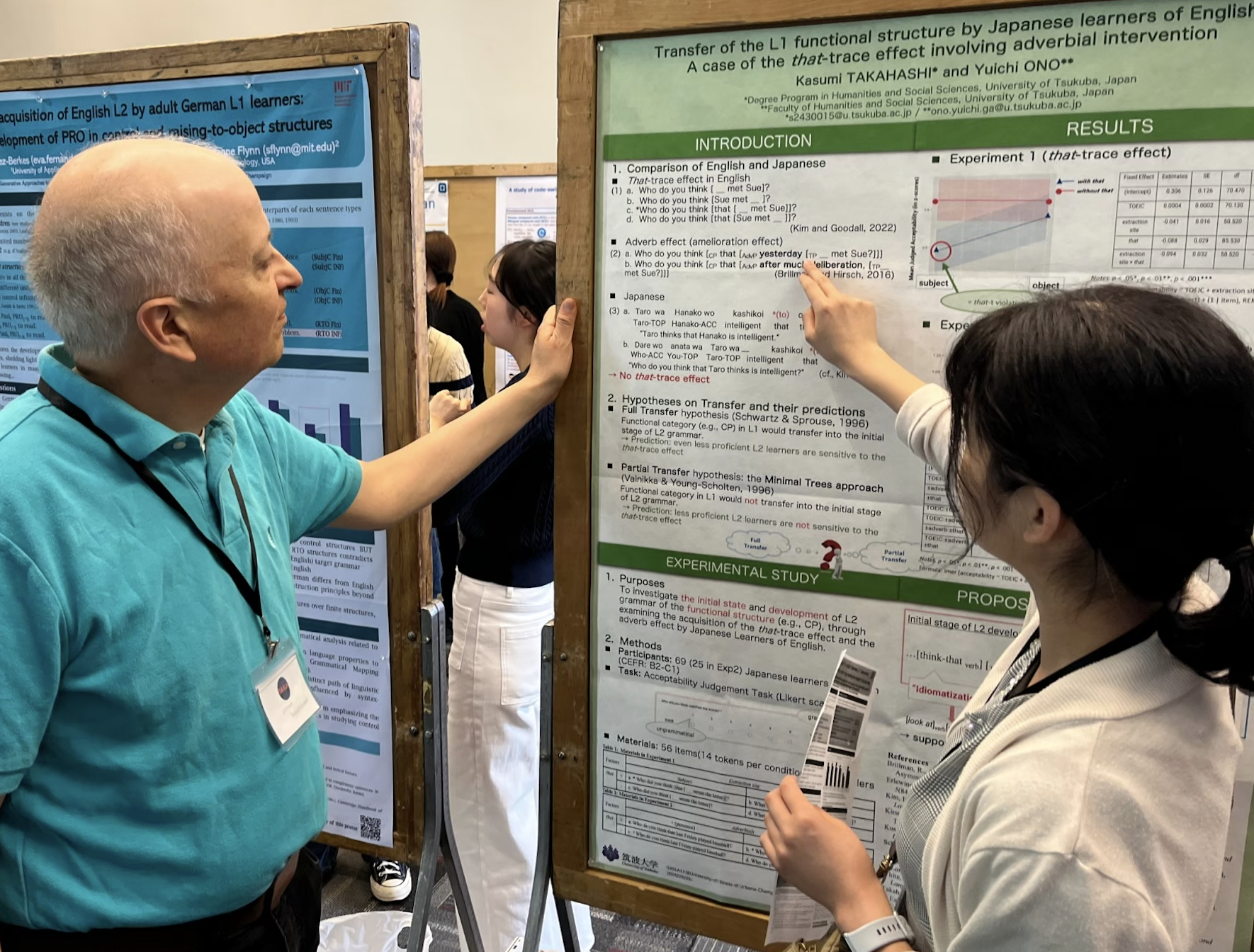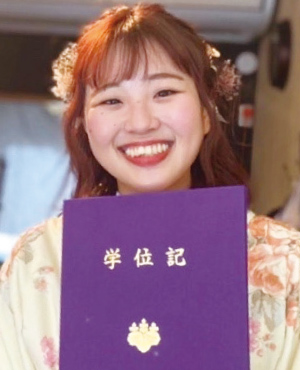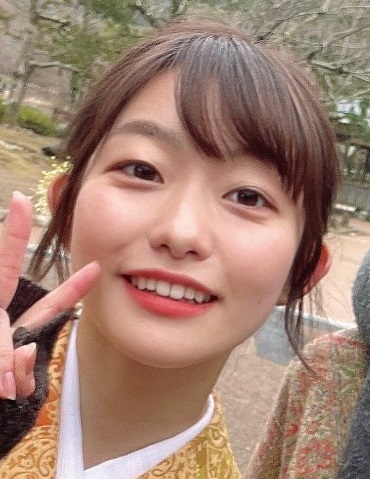応用言語学コース

従来の学問領域の壁を飛び越えた、学際的言語研究
応用言語学は、個人と社会のレベルで、言語現象を多角的・実際的に分析し、問題を解決することを目的とする学問です。
本応用言語学コースでは、英語教育にかかわるさまざまな事象を取り扱う英語教育学、社会と言語の関係を研究する社会言語学、文章や会話の仕組みを研究する文章・文体論を主要な領域にしています。
英語指導法や評価法に関わるさまざまな実験や調査をしたり、実際の談話を録音・書きおこして詳細に分析したり、文献からさまざまな文体を比較したりと、その手法はさまざまです。ぜひ、本コースで応用言語学の魅力を体験してください。
教授平井 明代
授業科目の一例
- 応用言語学概論
- 応用言語学講義I~IV(応用言語学、教育言語学、社会言語学、文章論)
- 応用言語学演習I~IV(教育言語学、社会言語学、文章論)
- 応用言語学特講I~II(教育言語学、社会言語学)
- 外書講読
授業紹介
応用言語学講義IVはどんな授業?
現代日本語を対象にした文章研究について、どのような手法やテーマ、課題があるのかを学びます。
文字言語にはどのような特徴があるのでしょうか。新聞、小説、雑誌、ブログ、といった媒体による違いや共通点にはどのようなものがあるのでしょうか。
TwitterやLINEに書かれることばは「書きことば」と言えるのでしょうか。実際の文章の観察を通して言語学的に考える方法と基本的な知識を身に付けます。
先輩たちの卒業論文
- Effects of Congruency on Japanese EFL Learners' L2 Collocational Learning
- Oral Reading by EFL Learners: Effects of Silent Reading, Reading While Listening, and Slash Reading
- Effects of text cohesion on Japanese EFL reading process and comprehension
- 認知症の人の不満や怒りの表明とケアワーカーの対処場面の相互行為分析
- 振り込め詐欺における説得の技法の会話分析
- 聴覚障害学生と健聴学生との相互行為における修復の組織
コース担当教員からのメッセージ
※表示順が職階順でないことがあります
学生の声

卒業生小野 由香子
私はもともと英語に苦手意識を持っていました。
教師の指導も受けながら、自分なりに工夫して勉強するうち、英語が好きになりましたが、「どんな読み方をしたらよりよく理解できるのだろう」「自分は英語のどういうところに苦手を感じていたのだろう」と疑問が湧いてきました。
その結果、応用言語学に興味を持ち、第二言語習得や教授法について勉強することで、私のように英語に苦手意識を感じている学習者の役に立ちたいと思うようになりました。
筑波大学の応用言語学コースでは、英語教育学、社会言語学、文章・文体論など、様々な分野について学ぶことができ、それぞれの学生が扱うテーマも多様です。英語教育学の分野の中でも、語彙やリーディング、スピーキングなど、様々な研究内容があります。
私自身はリーディング研究に興味を持ち、卒業論文では英文読解における視覚情報の効果について調査を行いました。大学院生となった現在は、1人1台タブレットなど、デジタル端末を用いた英語学習が身近になっていることから、紙媒体との読み方の違いに着目して研究を行っています。
応用言語学の魅力は、授業を通して学んだり考えたりしたことが、実社会で役に立つことを実感できることにあると思います。母語である日本語や、第二言語習得など、私たちの身近にある言語について研究してみることはとても面白いと思いますし、応用言語学の様々な分野について学ぶ中で、自分にぴったりのテーマに出会えるはずです。
Applied Linguistics Course
Interdisciplinary linguistic research that transcends the barriers of conventional disciplines
Applied Linguistics aims to analyze linguistic phenomena in multifaceted, practical ways and provide solutions to issues at the individual and social levels. This course covers such areas as (a) English language education, which deals with a variety of phenomena involved in English language learning and teaching; (b) sociolinguistics, which studies the relationship between society and language; and (c) writing and stylistics, which studies sentence construction and conversational mechanisms. In this course, you carry out various experiments on English learning, analyze actual discourse, and compare various styles from literature, all of which are carried out in various methods. We encourage you to come and taste the glamour of applied linguistics with us.
ProfessorHirosada Iwasaki
Example of Subjects
- Introduction to Applied Linguistics
- Lecture on Applied Linguistics Lecture I - IV
- Applied Linguistics Seminar I - IV
- Applied Linguistics Special Lecture I - II
- Reading Foreign Literature
Course Introduction
What can you learn in Lecture on Applied Linguistics?
This course analyzes issues related to English vocabulary from the perspective of English language pedagogy, corpus linguistics, and lexicology. For example, what specifically does it mean to have “a large vocabulary"? Why do many Japanese fail to translate “jisho wo hiku” into English although they know the word “dictionary”? How can we tell “difficult” text from “easy” text objectively? This is a Content and Language Integrated Learning (CLIL) class and you will analyze these issues using English as a classroom language in this class.
Senior Graduation Thesis
- The Effects of L1 Use on Speaking Performance by EFL Learners at Different Proficiency Levels
- Oral Reading by EFL Learners: Effects of Silent Reading, Reading While Listening, and Slash Reading
- Effects of text cohesion on Japanese EFL reading process and comprehension
- Media Discourse Analysis of Copies in Men’s Fashion Magazines
- Conversational Analysis of Persuasion Techniques Used in Bank Transfer Fraud
- Repair in Interactions Between Hearing and Hearing-Impaired Students
Message From Course Faculty
Student Voices

GraduateFuyu Matsumura
I vaguely wanted to study languages when I entered this university; however, when I actually began studying, I became interested in the field of educational linguistics, such as how Japanese people learn English and how to teach English effectively.
Since I wanted to be a teacher, this field was particularly appealing to me. My graduation thesis dealt with how to set grading criteria for speaking activities done by junior high school students. It was very demanding to record their speeches and assess them over and over. However, I was very glad that I learned to accumulate data and was able to bring them into a final form.
Finishing my thesis brought me a great sense of accomplishment, which was something I had never experienced before. This taught me the importance of persistence in each research process. Currently I work as a teacher, so I will be using my research experience at Tsukuba University, for which I am very thankful.
